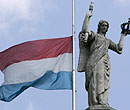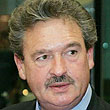Life In Luxembourg: Its Good To Be Unclassified
  Luxembourg Flag At Half-Staff Week of Mourning For the Pope Jean Asselborn: Luxembourg Foreign & Immigration Minister developing story Late January in 1996 a little old lady, crippled with arthritis, thin, bent over but always smiling, left her apartment and walked slowly towards the highway into the path of an approaching bus. She was dead instantly. She had never left home at that hour before. She lived below us where my German girl has resided for over 15 years, long before I arrived on the scene. That is how the Luxembourgers are. When they have nothing left to give. When they may become a burden on society. When life has been lived - many end up this way. They are a proud and independent people and have over 1200 years of history as a state. Luxembourg, unlike most of Europe, is rich and prosperous. Like most of Europe it suffers from declining birth rates and a growing elderly population. Luxembourg is totally dependent on foreign workers. The country is also a tax haven and attracts large sums of foreign capital. Its streets are lined with foreign banks from around the world. Its shops bustle with foreign tourists day and night. Its stores are filled with foreign goods. Foreigners flock here to park their money, to buy the cheaper cigarettes and alcohol, and to tank up their cars with the cheaper fuel. *Luxembourg Facts & Wealth Statistics Portuguese, French, Germans, Belgiens, Chinese, Americans and others work here for the higher wages, and the better benefits not found elsewhere. The country only has about 462,000 people, it is about half the size of Rhode Island, but it carries a lot of clout. Half of the population is foreign, and the Luxembourgers are fast becoming a minority in their own country. Its politicians write European law, and the European Court is headquartered here. This landlocked nation even has a chartered sea fleet. Its police now have two helicopters. Refugees from around the world come here for asylum. They are protected under European law and can find refuge here while their cases are examined and a determination as to their status is made. They sign contracts and officially state their case. The State quarters them in expensive hotels and supplies food and financial support while the determination process continues. The USA maintains an armory here, and a tank battalion. An American University has been long established here, and many American companies like Goodyear Tire and others have been doing business here for many years. Parts of the small Luxembourg Army serves along with American forces and other contingents in Bosnia and other parts of former Yugoslavia. For 5-10 years or longer Luxembourg had been home to thousands of refugees from the Yugoslavian-Bosnia war. Bosnians and others from that region worked here, went to school here, their children learning the language, and making friends. Now the situation in the Balkans has stabilized, and these former refugees are forced out. The local police arrive at their homes, and they are bused to the airport under guard, forced to depart to their homelands. Their refugee status has simply run out. Despite the fact that most have worked and paid taxes for years, their asylum contract is now null and void. My translation of the Foreign & Immigration Minister's Statement from the German: "I do not expect that you will agree with me. I just hope you will understand my arguments," to the Press. Jean Asselborn in his defense stated that the government has in the refugee question maintained its rights under the "Principles of a Sovereign State," which must be respected. Refugees who have had their asylum requests denied by the courts must be ready to leave for their homelands. The Government also holds this position, "We do not have the legal grounds that allows us to examine case for case the decisions of the judges ..." "Ich verlange nicht von Ihnen, dass Sie mir Recht geben. Ich wünsche mir bloß, dass Sie meine Argumente verstehen", fasste der Minister gegenüber der Presse die Haltung der Regierung in der Flüchtlingsfrage zusammen. Zu seiner Verteidigung führte Jean Asselborn in erster Linie die Prinzipien des Rechtsstaates auf, die es auch in dieser Frage zu respektieren gelte. Flüchtlinge, deren Asylgesuche in letzter Instanz von den Gerichten abgelehnt worden seien, müssten sich auf die Rückkehr in ihre Heimat einstellen. Daran habe sich auch die Regierung zu halten. "Wir verfügen über keine rechtliche Grundlage, die es uns erlauben würde, von Fall zu Fall gegen die Richterbeschlüsse zu verstoßen", hob der Minister hervor. Eine solche Vorgehensweise würde unweigerlich in politische Willkür münden." The Minister did state that he will defend the right of every refugee to stay in Luxembourg based on medical or fear of harm grounds. He further stated that not returning the refugees to war ravaged Bosnia and other areas of the Balkans will not help these countries to recover. ... and so I thought about the little old lady that ended it all. Who was there for her and how was she classified? ... and then thinking about the refugees and their children. Did the USA ever have this kind of a policy and classification? ... and then I thought about me. I am not a refugee, I am not an asylum seeker, I am unclassified. Labels: Armageddon, Bible Prophecy, Bush Brotherhood of Death  Stumble It! Stumble It! |















































Comments on "Life In Luxembourg: Its Good To Be Unclassified"
post a comment